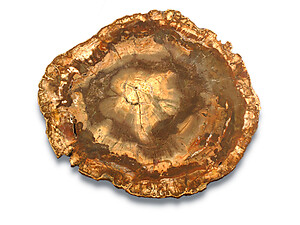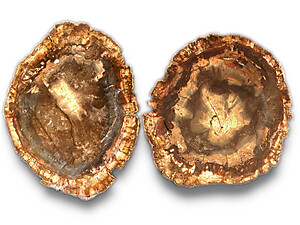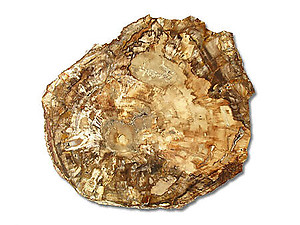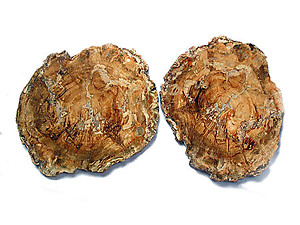Our Products
Petrified Wood Slices (10-14")
Petrified Wood Slices (10-14")
Petrified Wood is a fossil in which the organic remains have been replaced by minerals in the slow process of turning to stone. This petrification process generally results in a Quartz Chalcedony mineralization. Special rare conditions must be met in order for the fallen wood to be transformed into precious Fossil Wood or Petrified Wood. In general, the fallen trees get buried in an environment free of oxygen (anaerobic environment), which preserves the original tree structure and general appearance. The other conditions include a regular access to mineral rich water flowing through the wood, replacing the organic tree structure with inorganic stone. The end result is Petrified Wood, a tree, with its original basic structure in place, replaced by stone. This process could occur in less than one thousand years. Exotic minerals allow the rare red and green hues that can be seen in more rare specimens.
Petrified Wood Slices or Slabs from Madagascar. Norcross learned some of their techniques from the help of Bill Rose, a famous American petrified wood processor.
Petrified Wood is a fossil in which the organic remains have been replaced by minerals in the slow process of turning to stone. This petrification process generally results in a Quartz Chalcedony mineralization. Special rare conditions must be met in order for the fallen wood to be transformed into precious Fossil Wood or Petrified Wood. In general, the fallen trees get buried in an environment free of oxygen (anaerobic environment), which preserves the original tree structure and general appearance. The other conditions include a regular access to mineral rich water flowing through the wood, replacing the organic tree structure with inorganic stone. The end result is Petrified Wood, a tree, with its original basic structure in place, replaced by stone. This process could occur in less than one thousand years. Exotic minerals allow the rare red and green hues that can be seen in more rare specimens.
Petrified Wood Slices or Slabs from Madagascar. Norcross learned some of their techniques from the help of Bill Rose, a famous American petrified wood processor.
Petrified Wood Slices (10-14")
Petrified Wood Slices (10-14")
Petrified Wood is a fossil in which the organic remains have been replaced by minerals in the slow process of turning to stone. This petrification process generally results in a Quartz Chalcedony mineralization.
Special rare conditions must be met in order for the fallen wood to be
transformed into precious Fossil Wood or Petrified Wood.
In general, the fallen trees get buried in an environment free of
oxygen (anaerobic environment), which preserves the original tree
structure and general appearance. The other conditions include a regular
access to mineral rich water flowing through the wood, replacing the
organic tree structure with inorganic stone. The end result is Petrified Wood,
a tree, with its original basic structure in place, replaced by stone.
This process could occur in less than one thousand years. Exotic
minerals allow the rare red and green hues that can be seen in more rare
specimens.
Petrified Wood Slices or Slabs from Madagascar.
Norcross learned some of their techniques from the help of Bill Rose, a
famous American petrified wood processor.
Petrified Wood Slices (10-14")
Petrified Wood is a fossil in which the organic remains have been replaced by minerals in the slow process of turning to stone. This petrification process generally results in a Quartz Chalcedony mineralization. Special rare conditions must be met in order for the fallen wood to be transformed into precious Fossil Wood or Petrified Wood. In general, the fallen trees get buried in an environment free of oxygen (anaerobic environment), which preserves the original tree structure and general appearance. The other conditions include a regular access to mineral rich water flowing through the wood, replacing the organic tree structure with inorganic stone. The end result is Petrified Wood, a tree, with its original basic structure in place, replaced by stone. This process could occur in less than one thousand years. Exotic minerals allow the rare red and green hues that can be seen in more rare specimens.
Petrified Wood Slices or Slabs from Madagascar. Norcross learned some of their techniques from the help of Bill Rose, a famous American petrified wood processor.
Petrified Wood is a fossil in which the organic remains have been replaced by minerals in the slow process of turning to stone. This petrification process generally results in a Quartz Chalcedony mineralization. Special rare conditions must be met in order for the fallen wood to be transformed into precious Fossil Wood or Petrified Wood. In general, the fallen trees get buried in an environment free of oxygen (anaerobic environment), which preserves the original tree structure and general appearance. The other conditions include a regular access to mineral rich water flowing through the wood, replacing the organic tree structure with inorganic stone. The end result is Petrified Wood, a tree, with its original basic structure in place, replaced by stone. This process could occur in less than one thousand years. Exotic minerals allow the rare red and green hues that can be seen in more rare specimens.
Petrified Wood Slices or Slabs from Madagascar. Norcross learned some of their techniques from the help of Bill Rose, a famous American petrified wood processor.



